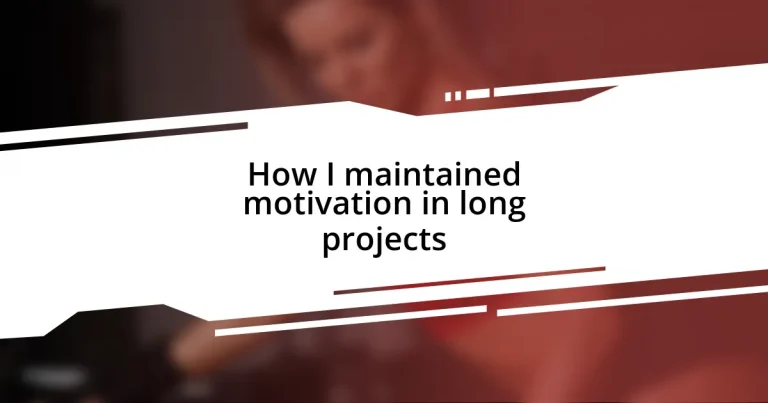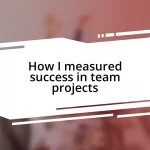Key takeaways:
- Setting clear goals and milestones helps maintain focus and provides a sense of accomplishment throughout long projects.
- Building a support network fosters motivation by encouraging shared experiences, accountability, and celebrating successes.
- Implementing effective time management techniques can enhance productivity and reduce burnout during extensive project timelines.
- Regularly reflecting on progress can transform feelings of stagnation into motivation and highlight growth, creating a positive outlook.
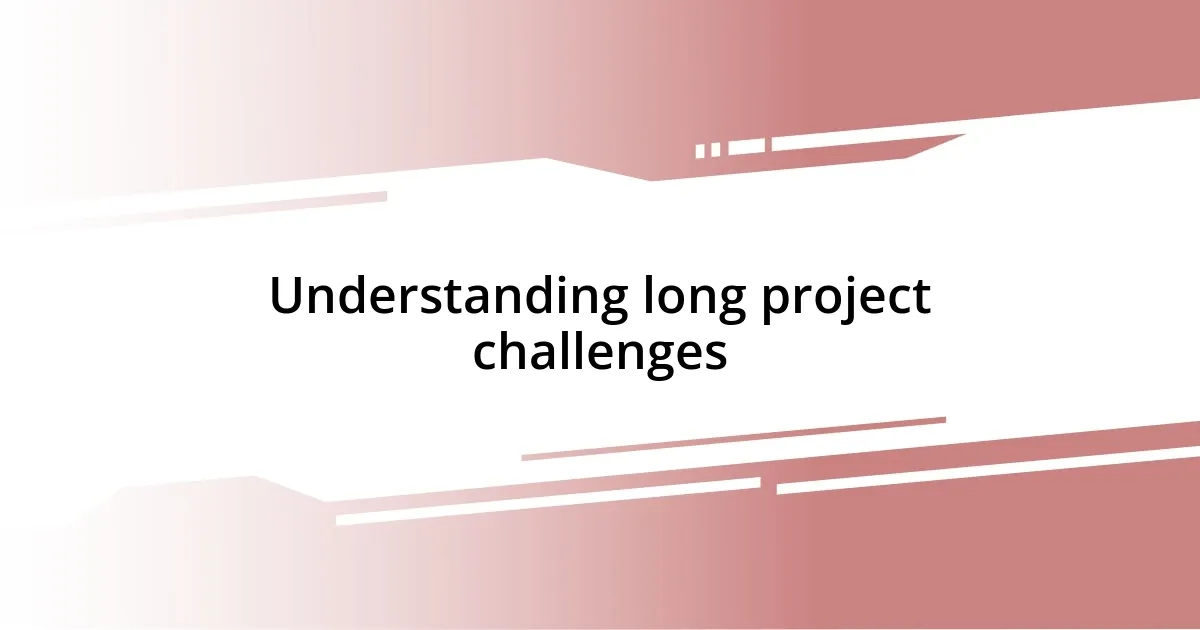
Understanding long project challenges
Long projects can often feel daunting, can’t they? I remember tackling a year-long project that had me questioning my sanity at times. The endless tasks, deadlines that seemed to stretch infinitely, and the nagging fear of losing focus made it a challenge just to get started some days.
One of the biggest hurdles I faced was maintaining a clear vision amidst the monotony. During my past projects, I’ve found that it’s all too easy to lose sight of the ultimate goal. When you’re knee-deep in tasks, how do you keep the end in mind without feeling overwhelmed by the everyday grind?
Moreover, collaboration and communication can become tricky during extended timelines. I once worked with a team that struggled to stay motivated as the project’s duration dragged on. It’s vital, I’ve learned, to continuously check in with your team and share wins, no matter how small. How do you celebrate progress in your long-term projects to keep spirits high? Taking a moment to reflect can truly transform the entire experience.
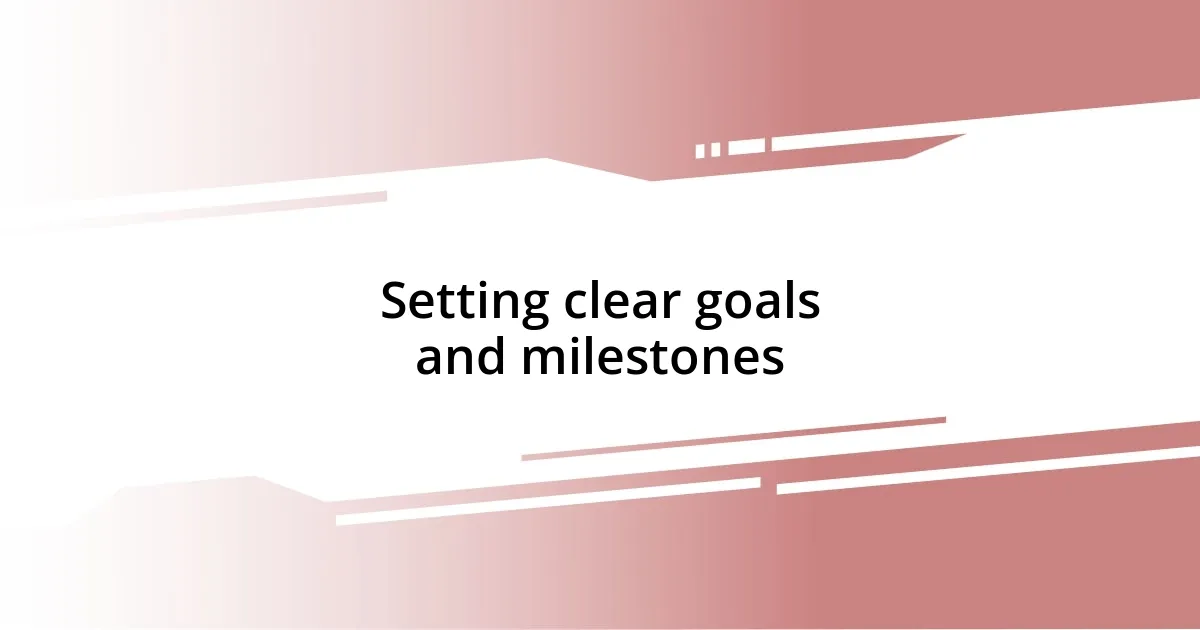
Setting clear goals and milestones
Setting clear goals and milestones is crucial in navigating long projects. I vividly remember a project where I set quarterly milestones, breaking down a daunting year-long task into manageable chunks. This approach not only helped me track progress but also created a sense of accomplishment every few months. It’s amazing how celebrating small victories can keep motivation high, don’t you think?
In addition, having clear goals provides direction. When I first started a lengthy project, I spent time outlining specific outcomes I wanted to achieve at each stage. This made it easier to pivot when challenges arose and ensured that I stayed focused. Without those clear benchmarks, I often felt like I was wandering aimlessly through the project.
I can’t stress enough how important it is to revisit and adjust those goals regularly. There was one instance when my initial deadlines didn’t align with unforeseen challenges in the project. By reassessing my milestones and timelines, I was able to realign my focus, which ultimately kept my motivation intact. Setting, assessing, and adjusting goals is a dynamic process that, in my experience, truly fosters long-term dedication.
| Goal Setting | Milestones |
|---|---|
| Provides clear direction | Creates a sense of achievement |
| Encourages periodic reflection | Allows for adjustments |
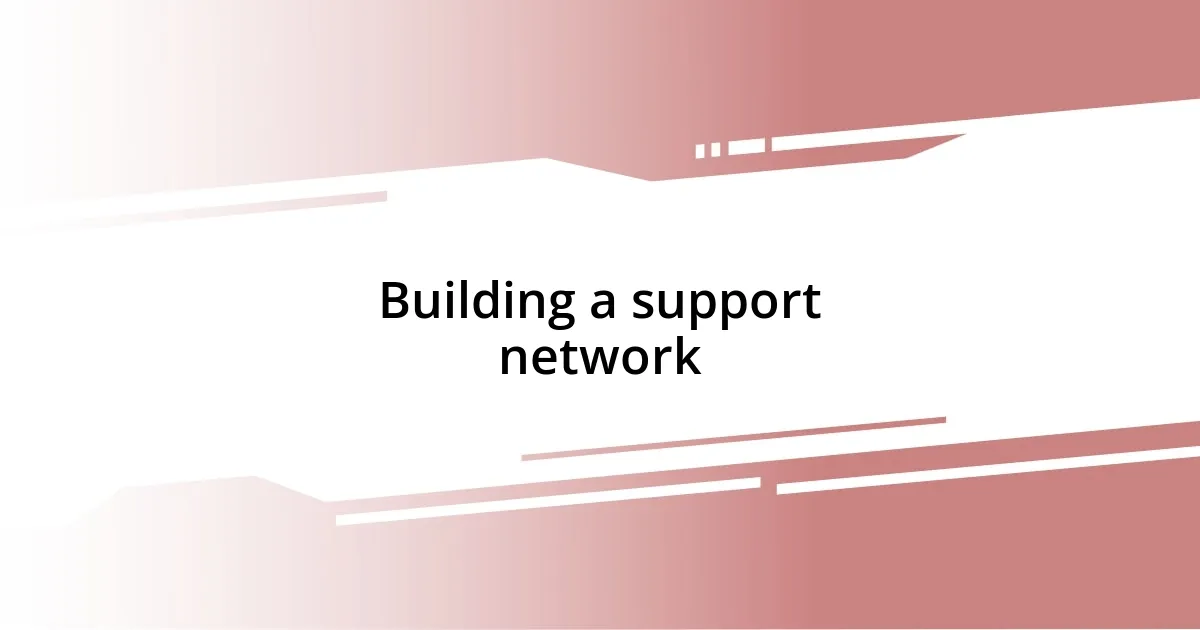
Building a support network
Building a support network is something I’ve found to be absolutely essential during long projects. I once joined a group of peers who were all navigating similar challenges. Just having that space to share frustrations, ideas, and motivation made the daunting road feel a little less lonely. I’ll never forget the times when a fellow team member reached out, reminding me that we were all in this together. Those conversations often reignited my passion for the project and provided much-needed encouragement.
To create an effective support network, consider these key strategies:
- Engage with peers: Seek out colleagues or professionals in your field who understand the complexities of long-term projects.
- Share experiences: Regularly connect to discuss your highs and lows; this fosters a supportive environment.
- Celebrate achievements: Acknowledge each other’s successes, no matter how small. It builds momentum.
- Provide accountability: Establish check-ins with your support network to keep each other on track.
- Utilize online platforms: Leverage social media or professional networks to widen your circle and gain fresh insights.
By relying on a supportive community, I found that motivation became less of a struggle and more of a shared journey.
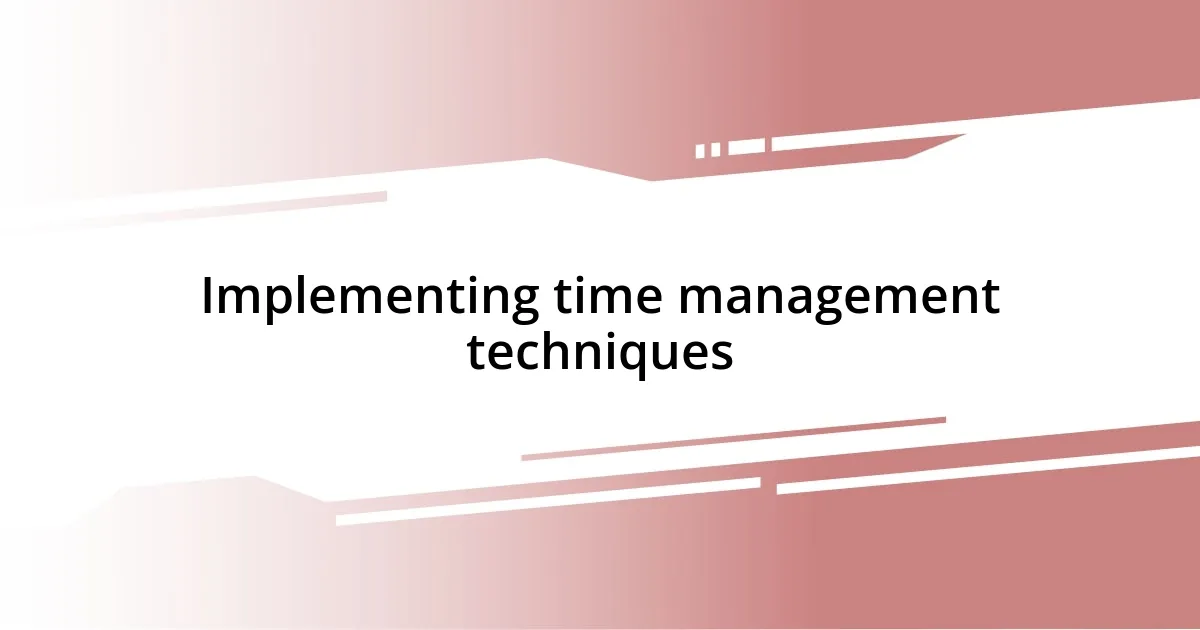
Implementing time management techniques
Implementing effective time management techniques has been a game changer for me in sustaining motivation throughout long projects. One strategy I often use is the Pomodoro Technique, where I work in focused bursts of 25 minutes followed by a short break. This method not only boosts my productivity but also prevents burnout. I remember a particularly challenging week when I was juggling multiple tasks, and these timed sessions helped me maintain my energy and focus. Have you ever tried working in short spurts?
Another technique that has served me well is the Eisenhower Matrix, which aids in prioritizing tasks based on urgency and importance. I’ve experienced moments where I felt overwhelmed by my to-do list, only to realize I was spending too much time on less significant tasks. By categorizing my responsibilities, I could concentrate on what truly mattered and, in turn, eased my stress. I found that crossing off important tasks brought an undeniable rush of satisfaction—almost like a mini-celebration in itself!
Scheduling my work around my peak productivity times has also made a significant impact. I’ve learned that I’m most alert in the morning, so I tackle complex issues during that time. Surprisingly, this adjustment led to better quality work and increased motivation. Have you ever considered how your own energy levels influence your productivity? Recognizing and aligning with your natural rhythms can profoundly enhance both performance and excitement within long projects.
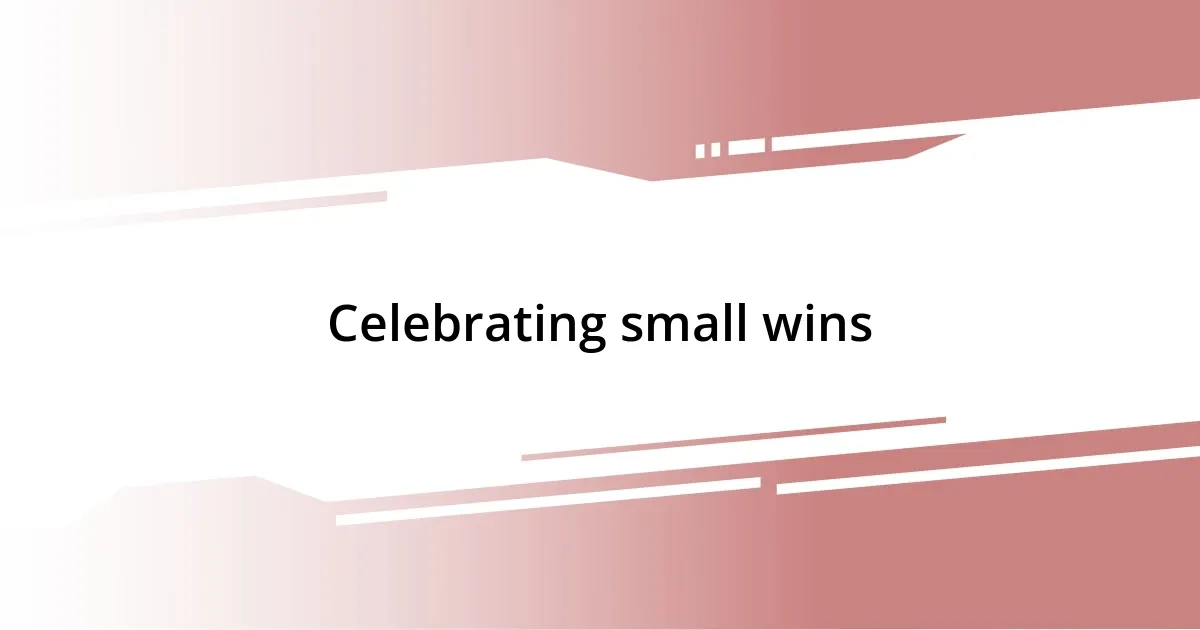
Celebrating small wins
Celebrating small wins has always been a cornerstone of my approach to long projects. I’ve noticed that when I acknowledge even the tiniest of achievements, it creates a positive ripple effect. For instance, after completing a challenging section of my work, I would treat myself to a favorite snack or take a moment to share the victory with my network. It’s amazing how a small celebration can reignite enthusiasm and push you forward. Have you ever felt that surge of motivation after sharing your progress with someone?
I remember a project where I faced numerous setbacks, and it felt like I was constantly climbing an uphill battle. Instead of waiting for the big finale to celebrate, I began recognizing small milestones: completing a draft, hitting a word count, or simply finishing a research phase. Each win, no matter how minor, boosted my morale. I even started using a visual tracker that filled up with color as I made progress. Watching it grow was almost like painting my motivational canvas. It made the journey feel tangible and rewarding.
It’s crucial to make these celebrations personal and meaningful. Whether it’s a warm cup of coffee while reflecting on what I accomplished, or writing a journal entry that captures my feelings, every little celebration reinforces my commitment to the project. I find myself asking: how can you infuse joy into your own progress? When you celebrate frequently, you not only recognize your efforts but also create an environment where motivation can flourish continuously.
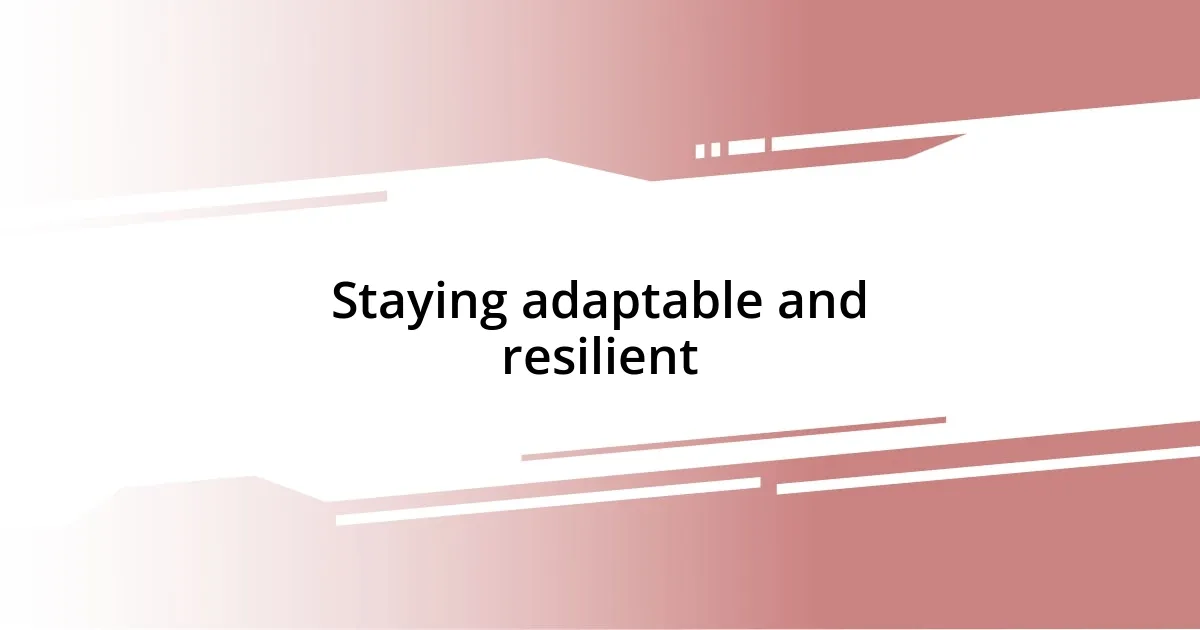
Staying adaptable and resilient
Staying adaptable and resilient is essential in the long hauls of any project. There were times when unexpected challenges popped up that could derail my focus. I vividly recall a moment when a significant change in project scope left me feeling frustrated. Instead of letting it bring me down, I chose to pivot my strategy and explored new solutions. That moment taught me the power of flexibility—adapting my approach not only salvaged my motivation but also opened doors to creative ideas I hadn’t considered before.
Another aspect of resilience comes from cultivating a positive mindset. I remember a particularly daunting project phase where feedback from peers felt more critical than constructive. Initially, I took it personally, but I quickly realized that viewing feedback as a growth opportunity was a game changer. Shifting my perspective to see these critiques as a chance to improve my work reinvigorated my passion. Have you ever found yourself stuck in a negative feedback loop? I encourage you to flip the script—embrace challenges as stepping stones rather than roadblocks.
Lastly, my experience has shown me how important it is to build a support network. On tougher days, speaking with a friend or colleague who has faced similar challenges often reminds me that I’m not alone. I recall a day when I felt completely drained, but a quick chat with a mentor turned my attitude around. Their encouragement reignited my motivation and helped me see that resilience isn’t just about individual strength; it’s also about leaning on others for support. How valuable do you think a supportive community is in your journey? I truly believe it can make all the difference when the going gets tough.
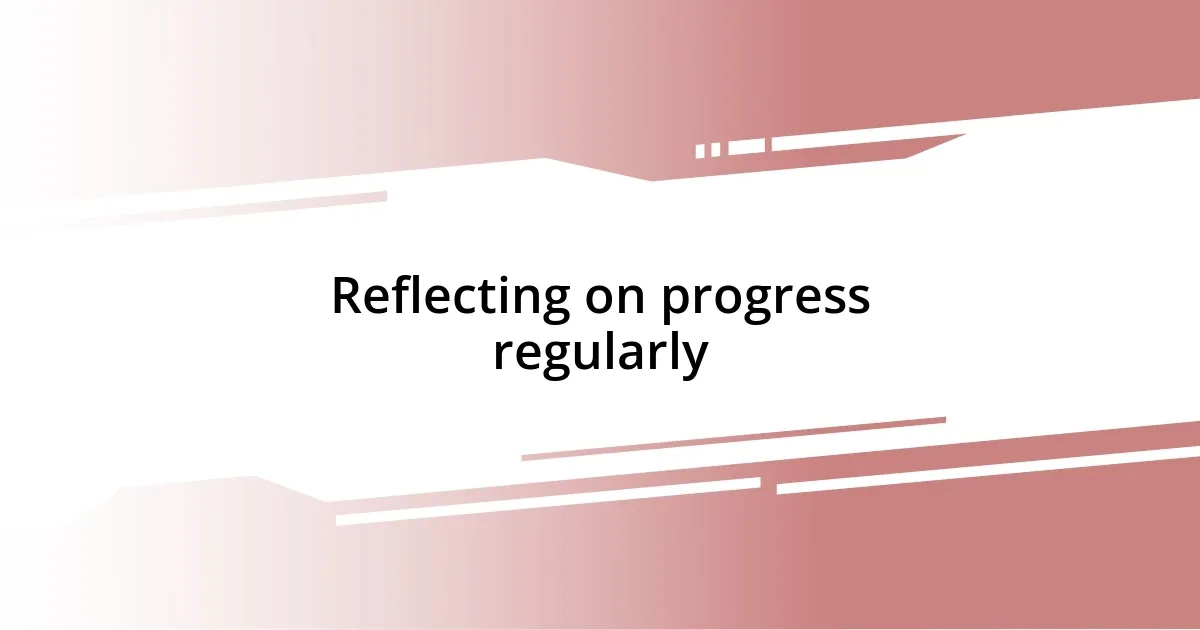
Reflecting on progress regularly
Reflecting on progress regularly has been a game changer for me. I remember a time during a multi-month project when I felt like I was trudging through mud. By setting aside short weekly reviews, I could see how far I had come, and that simple reflection turned dread into anticipation. Have you ever been amazed at your own progress when you take a moment to look back?
During one particularly intense project, I created a dedicated time to reflect on my progress every Friday. I would grab my favorite cup of tea and review my notes and accomplishments. It’s surprising how even a brief pause to assess what I had achieved could shift my mindset from feeling stagnant to recognizing growth. This reflection became a motivating force, reminding me that every effort, no matter how small, contributed to the bigger picture.
I’ve also discovered that sharing my reflections with others adds another layer of accountability. I began hosting casual check-ins with a couple of colleagues, where we exchanged insights on our projects. It was enlightening to hear their journeys and challenges, which made my own progress feel more substantial. How often do you discuss your progress with others? I found that these conversations not only solidified my achievements but also helped to foster motivation for the weeks ahead.












